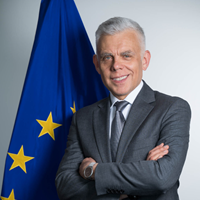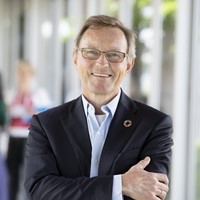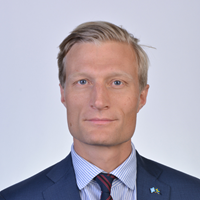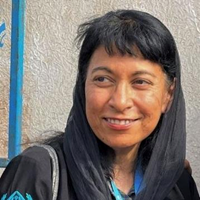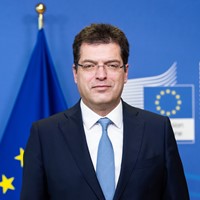




Anders Pedersen
International Director
Organisation
Swedish Red Cross
NGO
Speaker session
Registration and Welcome Coffee
Russia’s war in Ukraine: protracted crisis and challenges of principled humanitarian action
Auditorium
This session will focus on reaching a common understanding and sharing best solutions on how to ensure effective and principled humanitarian action in Ukraine.
The session will discuss how donors can maintain a principled humanitarian approach, while being politically not neutral, and how we can ensure funding for Ukraine in the medium and long term. It will evaluate the opportunities and challenges for Nexus in Ukraine and debate how we can make sure that the humanitarian response can pave the way to the next steps, i.e. early recovery, social safety nets, and reconstruction.
Overall, the session will draw and evaluate lessons learnt in Ukraine and provide recommendations for future principled and sustainable humanitarian actions.
Responding to an unprecedented global food crisis and averting famine
Auditorium
Soaring humanitarian needs and limited resources: Engaging emerging donors and new sources of financing
Auditorium
This session discusses a new “humanitarian narrative” in which humanitarian aid is framed as an investment and a common good. This narrative is framed by the ever-growing gap between resources for humanitarian assistance and humanitarian needs. . How new sources of funding (i.e. development and climate funding) can be mobilized will be discussed. In this context, the session will also debate how to get more concrete commitment from aid organizations to provide assistance in a more efficient and effective manner, working together much stronger and distributing tasks more systematically in line with their core strengths. Finally, the session will seek the support of minimum benchmarks for national humanitarian budgets with the objective of additional and more balanced humanitarian funding.
The challenges of humanitarian negotiations and principled response. How far are you ready to go to save lives? The case of Yemen
Studio
This session aims to explore how we can reinforce unity in the humanitarian community when negotiating and maintaining a principled approach in challenging operating environments such as Yemen. The session will discuss questions like :
- How far are humanitarians ready to go to have access and save lives? What is the reality of red lines in practice?
- Why is it difficult for humanitarians to maintain a united position in humanitarian negotiations? What have we done well so far in maintaining a united position?
- What should we improve in the future?
Through these questions the session strives to learn from the Yemen experience and research, reinforce good practices such as the SOM process, and generate concrete recommendations to improve the coordination of humanitarian negotiations.
Networking breakfast – partners and DG ECHO management
Riverside
Q&A with Commissioner
Auditorium

Andreas Papacosntantinou
Director, Neighbourhood and Middle East, Directorate General for European Civil Protection and Humanitarian Aid Operations, European Commission
Biography
Organisation
EU commission
EU institutions
Speaker session
Registration and Welcome Coffee
Russia’s war in Ukraine: protracted crisis and challenges of principled humanitarian action
Auditorium
This session will focus on reaching a common understanding and sharing best solutions on how to ensure effective and principled humanitarian action in Ukraine.
The session will discuss how donors can maintain a principled humanitarian approach, while being politically not neutral, and how we can ensure funding for Ukraine in the medium and long term. It will evaluate the opportunities and challenges for Nexus in Ukraine and debate how we can make sure that the humanitarian response can pave the way to the next steps, i.e. early recovery, social safety nets, and reconstruction.
Overall, the session will draw and evaluate lessons learnt in Ukraine and provide recommendations for future principled and sustainable humanitarian actions.
Responding to an unprecedented global food crisis and averting famine
Auditorium
Soaring humanitarian needs and limited resources: Engaging emerging donors and new sources of financing
Auditorium
This session discusses a new “humanitarian narrative” in which humanitarian aid is framed as an investment and a common good. This narrative is framed by the ever-growing gap between resources for humanitarian assistance and humanitarian needs. . How new sources of funding (i.e. development and climate funding) can be mobilized will be discussed. In this context, the session will also debate how to get more concrete commitment from aid organizations to provide assistance in a more efficient and effective manner, working together much stronger and distributing tasks more systematically in line with their core strengths. Finally, the session will seek the support of minimum benchmarks for national humanitarian budgets with the objective of additional and more balanced humanitarian funding.
The challenges of humanitarian negotiations and principled response. How far are you ready to go to save lives? The case of Yemen
Studio
This session aims to explore how we can reinforce unity in the humanitarian community when negotiating and maintaining a principled approach in challenging operating environments such as Yemen. The session will discuss questions like :
- How far are humanitarians ready to go to have access and save lives? What is the reality of red lines in practice?
- Why is it difficult for humanitarians to maintain a united position in humanitarian negotiations? What have we done well so far in maintaining a united position?
- What should we improve in the future?
Through these questions the session strives to learn from the Yemen experience and research, reinforce good practices such as the SOM process, and generate concrete recommendations to improve the coordination of humanitarian negotiations.
Networking breakfast – partners and DG ECHO management
Riverside
Q&A with Commissioner
Auditorium

Axel KENES
Directeur général des Affaires Multilatérales et de la Mondialisation
Organisation
SPF Affaires étrangères, Affaires européennes et Commerce extérieur Belgique
Member State authority
Speaker session
Registration and Welcome Coffee
Russia’s war in Ukraine: protracted crisis and challenges of principled humanitarian action
Auditorium
This session will focus on reaching a common understanding and sharing best solutions on how to ensure effective and principled humanitarian action in Ukraine.
The session will discuss how donors can maintain a principled humanitarian approach, while being politically not neutral, and how we can ensure funding for Ukraine in the medium and long term. It will evaluate the opportunities and challenges for Nexus in Ukraine and debate how we can make sure that the humanitarian response can pave the way to the next steps, i.e. early recovery, social safety nets, and reconstruction.
Overall, the session will draw and evaluate lessons learnt in Ukraine and provide recommendations for future principled and sustainable humanitarian actions.
Responding to an unprecedented global food crisis and averting famine
Auditorium
Soaring humanitarian needs and limited resources: Engaging emerging donors and new sources of financing
Auditorium
This session discusses a new “humanitarian narrative” in which humanitarian aid is framed as an investment and a common good. This narrative is framed by the ever-growing gap between resources for humanitarian assistance and humanitarian needs. . How new sources of funding (i.e. development and climate funding) can be mobilized will be discussed. In this context, the session will also debate how to get more concrete commitment from aid organizations to provide assistance in a more efficient and effective manner, working together much stronger and distributing tasks more systematically in line with their core strengths. Finally, the session will seek the support of minimum benchmarks for national humanitarian budgets with the objective of additional and more balanced humanitarian funding.
The challenges of humanitarian negotiations and principled response. How far are you ready to go to save lives? The case of Yemen
Studio
This session aims to explore how we can reinforce unity in the humanitarian community when negotiating and maintaining a principled approach in challenging operating environments such as Yemen. The session will discuss questions like :
- How far are humanitarians ready to go to have access and save lives? What is the reality of red lines in practice?
- Why is it difficult for humanitarians to maintain a united position in humanitarian negotiations? What have we done well so far in maintaining a united position?
- What should we improve in the future?
Through these questions the session strives to learn from the Yemen experience and research, reinforce good practices such as the SOM process, and generate concrete recommendations to improve the coordination of humanitarian negotiations.
Networking breakfast – partners and DG ECHO management
Riverside
Q&A with Commissioner
Auditorium





